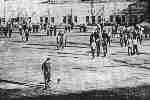
|
Internees in the courtyard of the Fort Henry internment camp, near Kingston (Photo from the Harry Spring Album, courtesy of the St. Lawrence Parks Commission). |
Prime Minister Mackenzie King once remarked that "if some countries have too much history, we have too much geography." Geography Canada still has in abundance, maybe even surplus; but as for the dearth of history, I wonder.
Canada is staggering through the final days of the Meech Lake trauma, in which history - or, rather, an acute sense of historical grievance - ran through the debate. In Newfoundland, where Meech Lake's fate now rests, every school child knows about the Churchill Falls hydroelectric deal in which Quebec, after the early years of the agreement, fleeced Newfoundland unmercifully.
In Manitoba, memories of the CF-18 maintenance contract that went to Montreal instead of Winnipeg color contemporary attitudes toward Quebec. Nor has time dulled memories of the angry debate not so many years ago about French-language rights in Manitoba.
With the Meech Lake debate fresh in our minds, it's worth reflecting on the use and abuse of history - especially the obligations of today's generations in regard to mistakes of the past - in connection with the Pandora's box opened by the government's 1988 decision to offer financial redress to Japanese Canadians interned during the Second World War.
When the Mulroney government made its decision in September, 1988, Minister of State Gerry Weiner insisted that the treatment of Japanese Canadians was "unique and unparalleled." In this space, a certain columnist opined that Mr. Weiner was "dreaming in Technicolor if he thinks the compensation package for Japanese Canadians doesn't set a precedent."
Predictably enough, it did. The Ukrainian Canadian Committee hit Ottawa this week asking for redress for internment of Ukrainian Canadians during the First World War. It followed on the heels of organizations representing Italian Canadians and Chinese Canadians who seek similar kinds of redress for historical injustices.
The government originally thought it might have to make redress payments to about 12,000 Japanese Canadians. By the end of May however, payments had been made to 16,350, with roughly another 1,000 cases pending.
The Ukrainian Canadian Committee might have been satisfied with a statement of apology, some historical plaques and possibly the financing of university chairs in Ukrainian studies. But once the government agreed to compensate Japanese Canadians, the Ukrainian-Canadian organization, like those representing Italian Canadians and Chinese Canadians, demanded money too.
Where does this end? Do we compensate Acadians who were expelled? The Irish who were badly treated when they arrived? Those interned during the War Measures Act of 1970? Native Canadians who signed iniquitous treaties? Do we compensate Canada's Jewish population for the grievous injustice done to their community when Canada turned its back on Jews seeking admittance before and during the Second World War?
History has many, often contradictory, lessons to teach us. It is essential to remember those that cast Canada in a dark light, so that they won't be repeated.
But there comes a point at which, in a linguistically and ethnically divided country, the search for restitution for past wrongs not only creates precedents that lead we know not where, but also risks piling up more divisions in a country already quite divided.
The search for war criminals in Canada pitted ethnic groups against each other. The redress for Japanese Canadians irritated other groups, including some veterans. And redress given to one group has obviously emboldened others to seek similar treatment, forcing today's generation to pay for policies and attitudes of generations past.
Having said yes to Japanese Canadians, the government cannot make a credible case for saying no to another group. A mixture of noble sentiments and crass multicultural politics produced the previous decision, and that same mixture beckons the government again. For better or worse, the country will be forced quite literally to pay for its history for many years to come.
![]() Return to Righting An Injustice Page
Return to Righting An Injustice Page
![]() Return to Internment of Ukrainians in Canada 1914-1920 Page
Return to Internment of Ukrainians in Canada 1914-1920 Page
![]() Return to Ukrainian History Page
Return to Ukrainian History Page
![]() Return to InfoUkes Home Page
Return to InfoUkes Home Page
Document URL: http://www.infoukes.com/history/internment/booklet02/doc-050.html
Copyright © 1994 Ukrainian Canadian Civil Liberties Association
Copyright © 1994 Lubomyr Luciuk
We acknowledge the help in the preparation of this document by Amanda Anderson
Page layout, design, integration, and maintenance by G.W. Kokodyniak and V. Pawlowsky
Copyright © 1996-1997 InfoUkes Inc.
E-mail: internment@infoukes.com
|
since Mar 1 1997 |
InfoUkes Inc. Suite 185, 3044 Bloor Street West Etobicoke, Ontario, Canada M8X 2Y8 Tel: (416) 236-4865 Fax: (416) 766-5704 |
Originally Composed: Tuesday December 3rd 1996.
Date last modified: Thursday October 30th 1997.